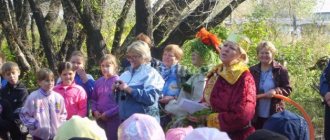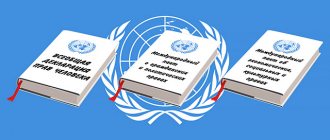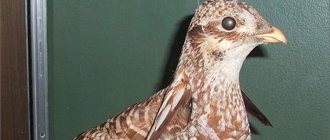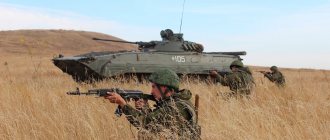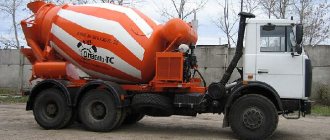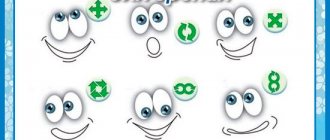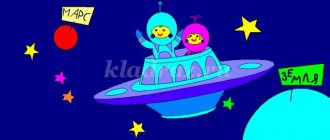Extracurricular event in the library “Nosov’s Stories”. Scenario for schoolchildren in grades 1-3
Scenario of the literary and game program “Reading the stories of N. Nosov” for children 6-10 years old
Author: Lutkovskaya Victoria Aleksandrovna, head of the branch, MUK "CSDB of Yaroslavl" children's library-branch No. 5, leisure.
The material will be useful to class teachers and librarians.
Event for students in grades 1-3. Aimed at updating knowledge about the works of N.N. Nosova, attraction to reading.
Scenario of a literary and gaming program for children 6-10 years old
Goal: to attract children to read the classics of Soviet children's literature and to study the works of N.N.
Nosova. Objectives:
Educational: expand students’ knowledge about the life of Nikolai Nosov, introduce them to the texts of the stories “The Living Hat”, “Patch”, “Mishkina Porridge”. Educational: to cultivate a love of reading, diligence, accuracy. Developmental: develop memory, attention, logical thinking.
Material:
two hats, 2-4 potatoes, paper “laces”, silhouettes of pants and patches and cords according to the number of children, disposable tableware: two cups, spoons according to the number of children, mixture for making porridge for babies, salt, sugar.
Decor:
book exhibition “Heroes of Nikolai Nosov”.
Progress:
Leader. Hello guys. Take a look at our book exhibition. Today there are books on it by the wonderful children's writer Nikolai Nosov (we are showing a portrait). You may be familiar with this name, try to name the books of this author that you have already read (children name). First, let's get acquainted with the life of the writer himself. He was born on November 23, 1908, that is, more than 100 years ago. He was very inquisitive and a dreamer. And of course, such a person, before starting to write books, experienced a lot of interesting things. I will name what Nosov tried to become, and you show the profession with gestures. (Children stand next to the chairs and show.) Presenter. Nikolai Nosov, immediately after graduating from school, wanted to be a violinist, then a chemist, an artist, worked as a digger, a log driver, a brick factory worker, a photographer, an electrical engineer, a newspaper seller, a musician, a teacher, a trainer, graduated from the Institute of Cinematography and became a film director and children's writer. One of Nosov’s heroes searched for himself for just as long. Maybe you can name him? (Children. Dunno.) You can show a doll or a fragment of a cartoon. Leading. This is one of the most famous heroes. Although he and other heroes of the Flower City had prototypes invented by the Canadian writer Palmer Cox. There are about forty characters in books about brownie people, among them there is a character named Dunno. Probably Nikolai Nosov also came across this book, and he came up with his own adventures for his favorite characters. Competition “Name the heroes of the book “The Adventures of Dunno and His Friends.” We divide the children into two teams and ask them to take turns calling out the names of the characters. The team where the children named the most names wins. Leading. Books about Dunno are some of the most famous in Nosov’s work. Cartoons were created based on “The Adventures of Dunno and His Friends,” “Dunno in the Sunny City,” and “Dunno on the Moon.” Competition "Connoisseurs". We offer small fragments from these cartoons for viewing and ask them to determine which book the fragment belongs to. The team where the children gave the most correct answers wins. Leading. But before “The Adventures of Dunno,” books about guys like you were born: “The Cheerful Family,” “The Diary of Kolya Sinitsyn,” “Vitya Maleev at School and at Home.” We will dwell in more detail on the funny stories from the collections “Dreamers” and “Knock-Knock-Knock”. I invite you to listen to the story “The Living Hat.” We read and discuss the content of the story: who are the heroes, what happened to them, why did the hat move? Competition "Living Hat". Participants from each team take turns throwing potatoes into their hats. We count the number of hits. The team in which the children hit more often wins. Leading. Another story that we will get acquainted with today is “Patch”. We read aloud, you can ask the children to read by role.
After reading, the presenter asks questions about the content of the story: what was the name of the hero, what color were the pants, what shape was the patch?
Teams can be given extra points for correct answers. Competition "Patch" - lacing. We give the children cardboard pants with holes and a cardboard patch with corresponding holes. We ask the children to “sew up” the hole. Pass the cord through all the holes. The team where all players completed the task faster will win. Leading. The last story we will read today is “Mishkina Porridge”. We read and discuss. Leading. What did the children do all day? What fish did they catch? How many? “Catch a Fish” relay competition. The teams stand in columns. In front of them are two inflatable pools with fish from fishing sets. Players take turns running up to the pools with a fishing rod, catching fish, and returning to their teams. The team in which the children completed the task faster and caught more fish wins. Leading. What was the name of the last story? Why? Competition "Mishkina porridge". We select one participant from the teams using a counting machine. He “cooks” the porridge (in a disposable container he cooks it from baby formula for making porridge, adding water, sugar and salt). All children receive two disposable spoons and taste both samples of porridge (without knowing who prepared which), voting for one of the samples. The team with the tastiest porridge will win. We summarize the results of the competitions, reward the winners, remember the titles of the works we read and the biography of their author. We give children the opportunity to read books from the exhibition. We say goodbye.
We recommend watching:
Literary game based on Kipling’s fairy tale “Rikki-Tikki-Tavi” for elementary school Literary game for primary schoolchildren of 4th grade with a presentation Literary game with presentation based on Kipling’s book “Mowgli” for 3rd grade Extra-curricular event in the library “Day of Accord and Reconciliation. One Hundred Years of the Great October Social
Similar articles:
Dedication to readers in the library, 1st grade. Scenario
Literary game in elementary school based on Andersen's fairy tales
Leave your comment
Ural student had his diploma grade reduced for having colored hair
Reading time: 1 minute
Valery Falkov will answer questions about the admissions campaign at Russian universities
Reading time: 0 minutes
Rosobrnadzor spoke about the preliminary results of the Unified State Exam 2021
Reading time: 3 minutes
Moscow authorities announced mandatory vaccination of education workers
Reading time: 2 minutes
In Moscow, people will be fined for using playgrounds during the period of restrictions.
Reading time: 1 minute
The medalists' ball was canceled in St. Petersburg
Reading time: 1 minute
Gift certificates
Responsibility for resolving any controversial issues regarding the materials themselves and their contents is taken by the users who posted the material on the site. However, the site administration is ready to provide all possible support in resolving any issues related to the work and content of the site. If you notice that materials are being used illegally on this site, please notify the site administration using the feedback form.
All materials posted on the site were created by the authors of the site or posted by users of the site and are presented on the site for informational purposes only. Copyrights for materials belong to their legal authors. Partial or complete copying of site materials without written permission from the site administration is prohibited! The opinion of the administration may not coincide with the point of view of the authors.
Source
Target:acquaintance with the biographical data and work of the writer E.N. Nosov, enriching vocabulary and developing coherent speech, nurturing aesthetic culture and artistic abilities, love of nature, consolidating reader interest.
Library design:
portrait of the writer, map of the Kursk region, posters with statements of famous people.
"My friend's song is like a thyme flower,
unselfish in appearance, but her tone is pure and high.”
V. Astafiev.
"Friends! Let’s say in advance: At any time and in any year - The whole planet will have glorious Kursk residents Always and everywhere in sight.” M. Svetlov.
Participants:
- Head library
- Head museum
- Educator
- Teacher
- Students
Progress of the event
The music "My Land" is playing
Head museum:
The books of the wonderful writer E. Nosov (1925-2002) glorified the Kursk land throughout the world. Perhaps another Russian writer V. Astafiev said the best about Nosov: “My friend’s song, like a thyme flower, is not selfish in appearance, but its tone is pure and high.” E.I. Nosov was truly a Master in everything - he wrote excellent stories and tales, essays and articles, miniatures and poems: He painted landscapes of his native Kursk region, full of subtle lyricism, warmed by the warmth of his heart. He knew how to take excellent photographs, his photographic sketches are akin to the best paintings. He didn’t know how to feel sorry for himself: That’s why he left us so early: But the Master left his legacy - his soul lives in every line, in every painting and photograph - his favorite spaces, hills, trees, rivers: They were his real friends, helped him live, give him joy. Just like now, everyone who picks up this album (display of the album “Colors of the Native Land”) will discover the amazing joy of communicating with nature, with its colors, with its discreet but sweet beauty in all seasons:
Head library:
(Refer to the map of the Kursk region). E.I. Nosov was born on January 15, 1925 in the village of Tolmachevo near Kursk. The war interrupted his schooling, and since 1943 he has been at the front, an anti-tank artilleryman. In 1945, he was seriously wounded near Koenigsberg and was in hospital - this is what the story “Red Wine of Victory” is about. About the war - the story “Usvyatsky Helmet Bearers”, on which the film “Spring” was based, stories - “Chopin, Sonata Number Two”, “Khutor Beloglin”, “Apple Spas”, “The Blue Feather of Vatolin”, “Commemorative Medal”, “Bassoon” " The films “Obezdchik” and “Gypsy Happiness” were made based on his stories. For the book of novels and short stories “The meadow fescue is noisy...” the writer was awarded the State Prize of the RSFSR named after. Gorky, for stories of recent years - the M. Sholokhov International Prize, the Moscow Singing Prize, the Smart Heart / named after. Platonov/, Fatherland Prize, A. Solzhenitsyn Prize.
E.I. Nosov was a Hero of Socialist Labor, an Honorary Citizen of Kursk, a full member of the Academy of Russian Literature; awarded two Orders of Lenin, two Orders of the Red Banner of Labor, the Order of the Badge of Honor, the Order of the Red Star, two Orders of the Patriotic War, 1st degree. There is very great warmth and cordiality in the words about E.I. Nosov of his friends, fellow writers. “Evgeny Nosov is an artist at every moment, an artist for life, so his well is inexhaustible,” said M. Obukhov. V. Cherkasov in one of his essays cites the thoughts of E.I. Nosova about Russian classics - Tolstoy, Turgenev, Gogol, Chekhov, Bunin - “: their work is a haven for our souls, like an oak forest is a shelter for weary travelers: But the oak does not rot, it has an iron core:”
Educator:
And as the Master says about poetry!... Good poetry has always seemed to me like well-fried rye cracker. And don't let this comparison scare you. Unlike a raw loaf of bread, all excess is evaporated from it, leaving only a dry, concentrated substance. Yes, sometimes they break their teeth and tear their mouths, O biscuit. But what kind of poetry is this, which, like a slob, is swallowed without chewing!? But don’t forget the aroma when you chew a piece! And smoke, and a house, and a field, and Russia, and free will will blow from every crumb of it. And you are amazed: from what?... One of my friends noticed that if the whole sky were completely strewn with stars, then we would not see the stars themselves. True talent is rare and will remain rare forever, and therefore it has the significance of national value. The forest is large, but there may be only one root of ginseng. Or not be there at all. Apparently, even here in the forest, nature took care to avoid satiety, to prevent every burdock from imagining itself as the root of life.
Student:
Poems from the Master's archives.
Year of the Horse!.. Eh, give me the reins! The mane is a blizzard, snow from under the hooves: I will rush like a starry flood Through Rus', which does not sleep. The lights are glowing among the snowdrifts, the bell is heard. The month is a ladle, pour some wine for testing, treat all the travelers around. Sprinkle my horses for good luck, So that they don’t lose their way in the darkness. Oh, you are so old!.. White horses! Take you away somewhere: Or to where, beyond the distant line, Breathing through a frosty window, The candle flickers lonely, Like a soul without communion:
Student:
Waiting for the holiday. Blue and cheerful: Sun all day! The May lilac hung over the fence. Streams of fine spice flow in the air, As if somewhere gingerbread is being baked for the holiday:
Student:
E. Nosov about his small homeland.
: We, the people of Kursk, inherited the Kursk land: Bunin called this area with a discreet, but still amazing word: substeppe:
: I close my eyes, and - my heart sank with trepidation - here she is, my dear! Hills and hollows, and more hills. Up - down, down - up: As if breathing, as if these were her deep, labored sighs: Here we live, between these sighs. Here, in the wind, between the hills, our quiet broom villages are nestled, with mooing calves at rest:
Student:
E. Nosov about his small homeland.
Here they write: small homeland: But what is it? Where are its boundaries, from where and to where does it extend? How to calculate, measure, describe? In my opinion, the small Motherland is the backdrop of our childhood. Seen, heard and felt primal reality. That region under the cup of the azure sky, which a boy’s eye can embrace and contain a pure, open soul, where this soul was first surprised, rejoiced and rejoiced from the overwhelming happiness of being on earth. And where I was upset for the first time, shed my first tear, got angry and experienced my first shock.
Student:
“For a thousand miles around, Russia is our native land:” - these Turgenev words cannot but come to mind when you read the books of E. Nosov, who talentedly inherits in his work the artistic principles of Turgenev, his deep, effective love for nature and man. The master perceived nature not just with his sight and hearing, but also with his generous, wise heart. “What a festival of colors!..”
: Nature cannot be touched with rough hands, just as one cannot touch a pearly drop of dew in the cup of a flower, the pollen on the wings of a butterfly, the silvery head of a dandelion, woven from fluff and air, permeated by the sun: All this can only be admired. Touched it and ruined everything:
Student:
musical pause. Song. Sl. V. Dyukova, music. V. Dobrynina. "Live the spring."
Student:
Poems about the Master.
V. Korneev. “Not many people, I know, have it...!” In the tense silence, the words seemed to shock us. You talked about war - a terrible and cruel phenomenon. And he stood up so visibly - a moment, a moment of life in front of the embrasure: And these were stacks of books, shot point-blank by the censors. You spoke about the “leader”, about those who shouted: “With little blood:” You spoke about the need - peasant, large, widow. You talked about everything, disturbing the peace of those gathered, - About the fact that the black soil has collapsed, that souls are crumbling, crumbling. And a breath of revelation then exploded in us, disturbing us, and a truly pungent chill ran down our skin. Not many people, I know, are given the ability to speak like that, to live like that—with all their hearts! And sobers up the sweet singers of “Red Wine of Victory”
Student:
E. Nosov
To talk about Russia with love,
It’s not enough to adore her, my dear one.
And you need to live with her bottomless pain
And breathe her bright joy
The sadness and pride of the Russian soldier,
And a keen eye and a deep mind were seen
In the diamond of original talent
And in the heart, as if in focus, they glowed.
Librarian:
Great is the sorrow of the Kursk land for its glorious son - the writer E.I. Nosov, who passed away on June 12, 2002: E. Nosov was the son of not only the Kursk land, but also of Russia. He is known in Germany, Italy, Canada and many other countries. Read the “Book about the Master,” dedicated to the writer, and you will be convinced that time has no power over real talent, that it only multiplies his achievements:
E.I. died
Nosov: The loss is irreparable:
the last Patriarch of Russian literature, without whom national culture is unthinkable, has passed away. And for us, Kursk residents, this loss is the most bitter. Once Evgeniy Ivanovich said about L.N. Tolstoy, that he felt the whole of Russia with his bare heel. The above fully applies to Nosov himself. “Meddant”, “Home for Mother”, “Temple of Aphrodite”, “Don’t Have Ten Rubles”, “Red Wine of Victory”, “Chopin, Sonata Number Two”, “Usvyatsky Helmet Bearers”, “Aluminum Sun” - and everything else his work is the hidden sorrows and misfortunes of the people, the most exposed nerve of Russia.
E. Nosov did not write novels and stories; when he created poems, he was a modern Boyan, whose sad, tear-washed, but uplifting song was heard throughout the borders where the Slavic soul lived, for everything he wrote was the Legend of the Russian Land.
Teacher:
On the day of farewell to the writer, nature was rampant. She seemed to disagree with the departure of her most trusted spokesman. We will not agree either, he did not leave us, he will be with us as long as we ourselves are alive. And may the prophetic creations of the Master remain forever.
“Let us strengthen the energy of our good intentions”
And thoughts are seeds, Desires are already shoots, Actions are branches where fate is preparing for us to taste its fruit:
<:>I bless you - fly, I prayed and am praying for you. I bless you - take care of Love, children, Holy Russia!

